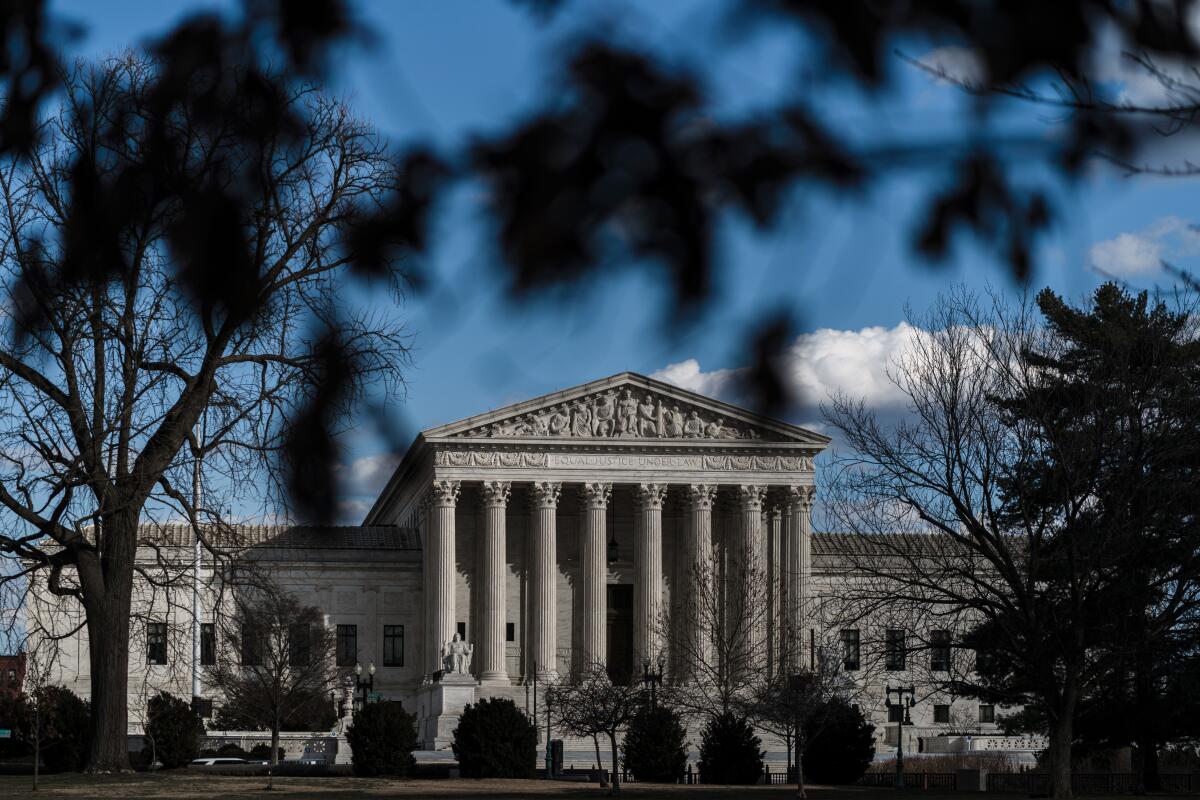Supreme Court rejects GOP redistricting pleas in North Carolina and Pennsylvania

- Share via
WASHINGTON — In a victory for Democrats, the Supreme Court has turned away efforts from Republicans in North Carolina and Pennsylvania to block state court-ordered congressional districting plans.
In separate orders late Monday, the justices are allowing maps selected by each state’s Supreme Court to be in effect for the 2022 elections.
In North Carolina, the map most likely will give Democrats an additional House seat in 2023.
The Pennsylvania map also probably will lead to the election of more Democrats, the Republicans said, as the two parties battle for control of the House of Representatives in the midterm elections.
The justices provided no explanation for their actions, as is common in emergency applications on what is known as the “shadow docket.”
Though the high court did not stop the state court-ordered plans from being used in this year’s elections, four conservative justices indicated they want to confront the issue that could dramatically limit the power of state courts over federal elections in the future. The Republicans argued that state courts lack the authority to second-guess legislatures’ decisions about the conduct of elections for Congress and the presidency.
“We will have to resolve this question sooner or later, and the sooner we do so, the better. This case presented a good opportunity to consider the issue, but unfortunately the court has again found the occasion inopportune,” Justice Samuel A. Alito Jr. wrote in a dissent from the Supreme Court’s order, joined by Justices Neil M. Gorsuch and Clarence Thomas.
Gerrymandering remains a significant problem, but so far, Democrats have held their own more than expected. Courts have played a major role.
Justice Brett M. Kavanaugh made a similar point but said he didn’t want to interfere in this year’s electoral process, which already is underway. The filing deadline in North Carolina was Friday.
The state courts were involved because of partisan wrangling and lawsuits over congressional redistricting in both states, where the legislatures are controlled by Republicans, the governors are Democrats and the state Supreme Courts have Democratic majorities.
In Pennsylvania, Democratic Gov. Tom Wolf vetoed the plan the Republican-controlled Legislature approved, saying it was the result of a “partisan political process.”
The state, with a delegation of nine Democrats and nine Republicans, is losing a seat in the House following the 2020 census.
Republicans said the map they came up with would elect nine Democrats and eight Republicans. State courts eventually stepped in and approved a map that probably will elect 10 Democrats, the GOP argued.
North Carolina is picking up a seat in the House because of population gains. Republican majorities in the Legislature produced an initial plan most likely to result in 10 seats for Republicans and four for Democrats. The governor does not have veto power over redistricting plans in North Carolina.
Californians who believe objectivity is the only thing that creates fairness in the redrawing of political boundary lines will likely be disappointed with the maps submitted to state elections officials
After Democrats sued, the state’s high court selected a map that likely will elect at least six Democrats.
Lawsuits are continuing in both states, but the Supreme Court signaled in Monday’s orders that this year’s elections for Congress in North Carolina and Pennsylvania would take place under the maps approved by the states’ top courts.
More to Read
Get the L.A. Times Politics newsletter
Deeply reported insights into legislation, politics and policy from Sacramento, Washington and beyond. In your inbox three times per week.
You may occasionally receive promotional content from the Los Angeles Times.












